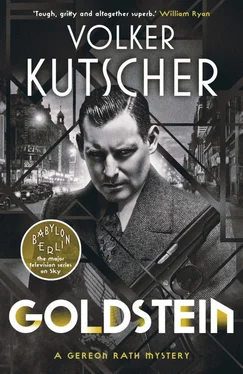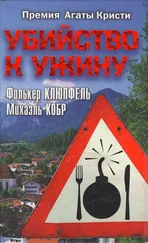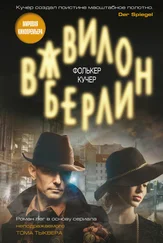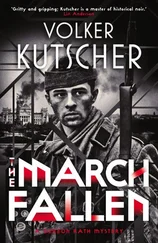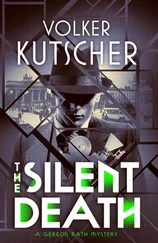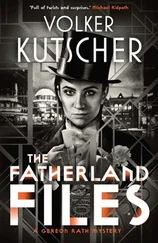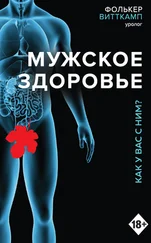She felt her rage swell, an impotent rage that made her beat the steel bars of the train in frustration. Outside the windows it grew dark as the train entered the tunnel. She had the feeling that people were watching her, but pulled herself together, battling against her rage and despair, and prepared for the next stop.
Strausberger Platz. Now or never. The train stopped, the doors opened and a number of passengers got out. Alex stepped onto the platform with the crowd of smokers, but remained by the door, so that those boarding had to push past her as she looked towards the front of the train.
Damn it! The cop had got off too, and he’d seen her. He was pointing towards her and shouting, ‘Stop that girl, she’s a thief!’
Most passengers didn’t react, or pretended not to have heard, but a fat man with a walrus moustache decided to intervene. ‘Calm down now, lass,’ he said. ‘You won’t be slipping through my fingers.’
‘Don’t touch me, fat ass!’
The fat ass grinned. ‘Would you look at that. You’re a cheeky one, aren’t you. Claws and all.’
‘Keep back!’
The stationmaster’s voice crackled over the loudspeaker. The fat man stuck out a chubby finger and blocked her path, while the cop approached from the other side of the platform. She had to do something, and she knew what.
‘Didn’t you hear? Keep back! ’ she said, kicking the man as hard as she could between the legs. He doubled in pain, turned dark violet and sat on the platform facing backwards.
Someone tried to shut the door but she jammed it with her foot, squeezing her body into the sliding door and prising it open. No sooner was she on board with the door closed behind her, than the train began to move. This time the cop hadn’t managed to follow.
All around her, passengers smoked as if what had happened was none of their concern. She pushed her way into a corner where no one could have witnessed the incident, feeling relieved but furious at the same time. The arsehole had tried to gun her down.
At least the train was heading east. She could get out at Petersburger Strasse and walk back to Flat A, where perhaps she’d run into Vicky or Kotze. She needed to feel as though she still had some friends in this city.
When the man in uniform spoke to her, a kindly sort with a white moustache, at first she merely shrugged her shoulders. She was so lost in thought that she didn’t understand what he wanted until he repeated his request.
‘Tickets please!’
It had worked, Goldstein had given them the slip. For a moment he thought he was being followed, but the man who emerged from a telephone booth on Kochstrasse and took the same route to the U-Bahn remained on the platform when he boarded. Through the whole journey he studied his fellow passengers to make sure there were no police among them. Only now, climbing the steps at Schönhauser Tor and stepping back into the light, was he certain the coast was clear. He took a deep breath, as if savouring a gentle sea breeze, when all he could smell was the city air with its lime-tree blossom, petrol and fresh asphalt.
How he enjoyed moving without that stubborn detective breathing down his neck. Rath was still sitting by the hotel lifts, convinced that Abraham Goldstein was inside reading the papers and twiddling his thumbs. All you had to do to shake off the cops was let them think they had everything under control.
He glanced at the piece of paper in his hand: Grenadierstrasse . If he had understood her correctly, it had to be here somewhere. He looked around at workers laying steaming asphalt on a patch of road, newspaper boys shouting headlines outside a corner bar, a horse and cart turning the corner, carrying vegetables under a dirty-grey canopy. He crossed the carriageway and followed. This had to be the way. He knew he was in the right place when he read the sign.
The street was busy, but a little run-down, the stucco on the fronts dirty-brown and starting to crumble. Washing hung from some of the windows. Almost everywhere, goods were being sold, even on pavements. Some traders sold directly from their carts. Everywhere he looked, he saw Hebrew letters and Stars of David, either on shop signs or painted on the display windows themselves. Apart from on the Lower East Side, he’d never seen so many Jewish shops in one place, not even in Williamsburg, or so many caftan wearers.
He wasn’t sure whether he felt contempt or revulsion, he only knew that he didn’t want anything to do with these men in their sombre, black uniforms, and that he liked the young men with dark sidelocks even less than their white-bearded elders. Their world seemed to embody everything he had left behind: the cramp of his parents’ two-room flat, his sickly mother and his eternally praying, yammering father. He had hated all of it. Abe, Fat Moe had once said, you’re a goddamn anti-Semite, a Jewish anti-Semite, and laughed his cackling laugh. Neither part was true of course, he wasn’t an anti-Semite, but neither was he a real Jew. At least not the kind his father would have wished for.
The doubts had started after his Bar Mitzvah, when he ought to have felt a sense of belonging but instead turned his back more and more on the God of his fathers. Perhaps it was his mother’s illness that drove him under the bridge to Moe? Or perhaps it was only her death? He could no longer say. All he knew was that, since that day he felt only revulsion for his father’s world, and for those devout self-righteous men with whom Nathan Goldstein spent more and more time now that his wife was gone. The old man and his yammering… He called it praying but it was really no more than self-pity – and at some point Abe had no longer been able to stand it. Shunning the family home more and more, one day shortly after he turned fourteen he stopped going back. Better to live an unsettled life than to be sent to Aunt Esther, who wasn’t even his aunt, or indeed to a home, for that was what his father wanted when he realised he could no longer issue orders to his son.
Back then Abraham Goldstein didn’t know much about life, but he did know one thing: that he never wanted to be like his father.
He wanted to be an American, not a Yid who bemoaned his fate every day and railed at Yahweh; who knew nothing, and didn’t want to know anything but his Mishnah and Gemara; who couldn’t speak English properly and was afraid of Americans, as though every Goy was a Russian cossack, even in the middle of Williamsburg. No, Abraham Goldstein, whom everyone in the neighbourhood called Abe – another grievance of his father’s – had decided not to be afraid of the Goyim, of the Jewish people or of God.
He had already been hanging around with Fat Moe’s boys before he left his father and their claustrophobic little flat. In time, Moe’s boys would become the family he never had, American through and through. Every one of them was Jewish, but they were American Jews, the sort who didn’t bemoan their fate, but bent it to their will when it took an expected turn.
Even if he and his father walked the same streets, in the same Williamsburg, under the same grey American skies, they inhabited different worlds. So different, in fact, that they never saw one another anymore, even though Nathan Goldstein walked over Williamsburg Bridge every day on his way to work at Greenberg’s clothes factory on the Lower East Side, every day there and back, too tight or too poor for the journey on the Jamaica Line. Abe wouldn’t see him again until the day his mortal remains were installed in their last resting place at Linden Hill Cemetery. Abe was so drunk he could scarcely remember it, only that his father’s bearded caftan-wearing friends were already saying Kaddish when the drunken, beardless son of the deceased descended upon the ceremony. Since Abraham Goldstein was no longer capable of praying alongside them, indeed, could scarcely stand on his own two feet, the men in black had bundled him into a taxi and sent him away.
Читать дальше
